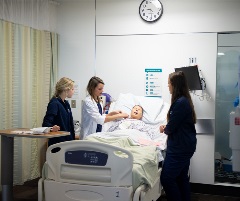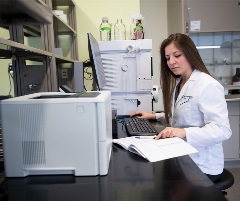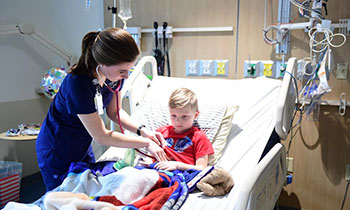Insights Blog

Cedarville Insights provides answers to your pressing questions about Microsoft Word, Excel, and Powerpoint, as well as college undergraduate and graduate programs, theological and philosophical questions, and general purpose information.
Healthcare Workers in High Demand: Is This Career Field for You?
According to a recent CNN article, healthcare jobs are in higher demand than ever — and healthcare companies are offering applicants appealing incentives to fill their open roles.
With Cedarville’s exceptional reputation in the healthcare industry, our programs can prepare you to meet this growing need with excellence and Christlike care. Cedarville prepares its healthcare students to be nurses, physician assistants, athletic trainers, EMTs, pharmacists, and more.
Continue reading »
Posted in DNP Graduate Certificate in Healthcare Administration Graduate Certificate in Public Health Master of Athletic Training MSN Pharmacy PharmD Physician Assistant Premedical Program
Why Choose a Nurse Practitioner Career?

Nurse practitioners continue to be among the most desirable fields in healthcare. Not only do they make a tangible difference in the lives of their patients, nurse practitioners also enjoy competitive salaries and generous benefits.
If you’re a nurse who is ready to take the next step in your career, now may be a great time to pursue a career as a nurse practitioner.
Continue reading »
Posted in DNP MSN MSN Adult Gerontology MSN Family Nurse Practitioner
Choosing Primary Care vs. Acute Care for Your Nurse Practitioner Specialty
 In the ever-evolving landscape of healthcare, nurse practitioners (NPs) play a critical role in providing patient-centered care. Among them, primary care nurse practitioners and acute care nurse practitioners stand out as two distinct arms of healthcare delivery. While both share the core values of compassion and medical expertise, their roles, responsibilities, and scopes of practice are very different. How do you decide which is right for you? Let’s examine the differences that set primary care nurse practitioners and acute care nurse practitioners apart.
In the ever-evolving landscape of healthcare, nurse practitioners (NPs) play a critical role in providing patient-centered care. Among them, primary care nurse practitioners and acute care nurse practitioners stand out as two distinct arms of healthcare delivery. While both share the core values of compassion and medical expertise, their roles, responsibilities, and scopes of practice are very different. How do you decide which is right for you? Let’s examine the differences that set primary care nurse practitioners and acute care nurse practitioners apart.
Continue reading »
Posted in Graduate MSN MSN Adult Gerontology MSN Family Nurse Practitioner MSN Pediatric Nurse Practitioner
5 Reasons to Get a Graduate Certificate in Public Health

You may be interested in pursuing advanced education in public health but don't want to commit the time, or money, to a master's degree. Is a graduate certificate a good option? Yes, and there are 5 reasons why.
Continue reading »
Posted in Graduate Certificate in Public Health MSN
Top 5 Reasons to Choose a Christian Graduate School

There are a lot of good options for graduate schools. As a Christ-follower, is it that important to choose a Christian university? Shouldn’t fields like business, nursing, pharmacy be the same anywhere? Turns out, they are not.
Learn 5 reasons to consider a Christian university for graduate school.
Continue reading »
Posted in MBA MSN MTS - Ministry PharmD
Did You Know? Facts About Master's Degrees
 Did you know that jobs that require a master’s degree at an entry-level are projected to grow by 15% between 2019 to 2029? Or that nearly 2/3 of students finishing a baccalaureate degree plan to complete a master’s
degree? How about that nearly 1/4 of master's degree recipients in 2018-19 were underrepresented minorities, giving them a critical pathway to job security and higher pay?
Did you know that jobs that require a master’s degree at an entry-level are projected to grow by 15% between 2019 to 2029? Or that nearly 2/3 of students finishing a baccalaureate degree plan to complete a master’s
degree? How about that nearly 1/4 of master's degree recipients in 2018-19 were underrepresented minorities, giving them a critical pathway to job security and higher pay?
Continue reading »
Posted in Master of Athletic Training MBA MDiv MSN MTS - Ministry PharmD
Balancing Job, Family, and Grad School: 5 Principles for Christian Nurses
 “How do you do it?”
“How do you do it?”
That was usually the question that people asked after they discovered that I was enrolled full time as a graduate student in the dual-track Nurse Educator and Family Nurse Practitioner focus areas in the M.S.N. program at Cedarville University. As a wife, mom of three under 12, contingent nurse at an inpatient hospital unit, adjunct clinical professor, and active member of the church, I understood why they were asking. When I felt the Lord calling me to pursue a degree as a nurse educator and family nurse practitioner, I entered with prayerful fear and trembling. Hanging over my computer — where I have spent countless hours (many during a pandemic and many during long nights) — were the following 5 guiding principles that helped me balance my job, family, and graduate school.
Continue reading »
Posted in MSN
How Should Christian Nurses Respond to COVID Burnout?
by Scott Long, MS, RN, AGACNP-BC, CCRN
 Critical care is a job that I have felt called to since day one of nursing school and have since expanded my skills to an Acute Care Nurse Practitioner in the Intensive Care Unit. I have felt blessed and honored to be a person
whom God has given an ability to provide comfort to patients and/or families. This is a stressful job that can be rewarding but also leave you walking out of work crying alone or in a co-worker’s arm. The COVID-19 pandemic has added even more
to stress, anxiety, and even burnout, but that is where we need a strong support system of people. We can confide in others but, ultimately, we can get so tied up with our professional occupation and keeping up on the most up-to-date information that
we lose time with God. If there is anything we need to do more than ever is to spend time in God’s Word and prayer to provide us with spiritual and mental strength through life’s storms personally and professionally.
Critical care is a job that I have felt called to since day one of nursing school and have since expanded my skills to an Acute Care Nurse Practitioner in the Intensive Care Unit. I have felt blessed and honored to be a person
whom God has given an ability to provide comfort to patients and/or families. This is a stressful job that can be rewarding but also leave you walking out of work crying alone or in a co-worker’s arm. The COVID-19 pandemic has added even more
to stress, anxiety, and even burnout, but that is where we need a strong support system of people. We can confide in others but, ultimately, we can get so tied up with our professional occupation and keeping up on the most up-to-date information that
we lose time with God. If there is anything we need to do more than ever is to spend time in God’s Word and prayer to provide us with spiritual and mental strength through life’s storms personally and professionally.
Over the last 18 months, we have watched COVID-19 grow from what at first was distant, unless you lived in China, where it all started. This virus spread increased in size and its impact became evidently clear as it deprived hospitals of critical care beds in certain areas to even have the U.S. Navy deploy the hospital ships to Los Angeles and New York City as well as Samaritan’s Purse deploying a Disaster Assistance Response Team (DART) to set up field hospitals in Central Park and in Italy to allow an opportunity to expand the access of critical care capabilities. Now we see the Delta variant stretching healthcare, hospitals at capacity with not just COVID but in general higher acuity patients. It feels we are continuing in disaster response status. As Christian health workers, what should be our perspective and response at this time and how can we help reduce burnout among nurses?
Continue reading »
Posted in MSN
FNP Clinical Requirements: 3 Things You Need to Know
As you consider pursuing graduate education toward becoming a Family Nurse Practitioner (FNP), it’s important that you ask the right questions to set yourself up for success. MSN FNP programs require clinical hours for degree completion. Securing a clinical placement can be challenging and a source of stress for many students. There are three important questions you should consider as you plan to pursue graduate education toward becoming an FNP: 1. Is it possible to work full time while...Continue reading »
Posted in MSN
















